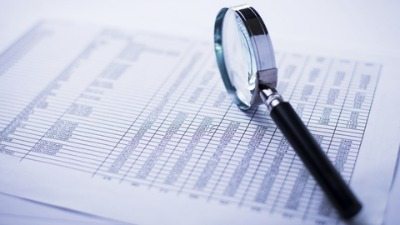 While many people might associate any professional with the word "forensic" in the title with criminal investigations, there is much more to forensic accounting.
While many people might associate any professional with the word "forensic" in the title with criminal investigations, there is much more to forensic accounting.
Compared to a traditional accountant, a forensic accountant combines accounting knowledge and legal expertise to help their clients, from individuals to small and large businesses.
Trained in cases involving criminal investigations and civil procedures, these professionals are naturally inquisitive, which allow them to find hidden assets in divorce cases or detect fraud and employee theft. The forensic accounting field requires professionals to analyze massive amounts of complex information and simplify them into reports for their clients to communicate their findings.
Here are some legal cases that require forensic accounting:
Criminal Investigations
With billions of dollars lost to fraud and criminal activity each year, forensic accountants serve as key players in helping law enforcement authorities investigate crimes that might result in financial losses. As crucial support for criminal investigations, a forensic accountant reviews documents in cases involving corruption, various forms of fraud and other financial schemes that violate state or federal laws.
For example, a head executive could be suspected of falsifying financial statements to inflate the company’s value to shareholders. To investigate these claims, an accountant will collect and investigate information consisting of financial documents, emails and other forms of communication.
Forensic accounting is one of the fastest growing fields with individuals, law enforcement authorities, governments and other entities demanding investigations into criminal matters. In 2012, special agent accountants made up 15 percent of the Federal Bureau of Investigation’s agents. These agents are engaged in forensic analysis of financial records, such as credit card statements or documents filed with the U.S. Securities and Exchange Commission. Through gathering the most important information in these documents, forensic accountants can provide reports to law enforcement authorities that can be used in a court of law to present against individuals who are suspected of white-collar crimes.
An accountant might also work with law enforcement authorities to determine and provide evidence involving money laundering. In addition to looking for inconsistencies that might indicate white-collar crime, these professionals tend to be charged with locating and recovering assets that may be hidden from corporate financial statements, which is often the case for individuals accused of laundering money. In these scenarios, a forensic accountant should be aware of the objectives of the case and analyze critical documents that show wrongdoing.
Duties for forensic accountants helping with criminal investigations include:
- Analyzing personal and business documents.
- Tracing and recovering hidden assets.
- Tracking and reconstructing transactions and wire transfers.
Fraud
Although traditional accountants may stumble upon fraud while performing financial audits, a good forensic accountant has an instinct for anticipating and sniffing out fraud. Fraud detection is one of the important skills for professionals in the forensic accounting field, according to a survey by the American Institute of Certified Public Accountants (AICPA).
The financial losses that stem from work-related fraud total $994 billion each year, according to the Association of Certified Fraud Examiners (ACFE). However, there is more than money on the line for companies that have employees committing theft or fraud. Shareholders and the customers lose trust of businesses where fraud has taken place.
Small businesses might hire a forensic accountant if a business owner suspects an employee of embezzling money. While these alleged criminals may try to hide any signs of wrongdoing, a forensic accountant - with a keen eye for signs of fraud - can trace the suspicious transactions and observe and interview employees who may have regular access to funds and determine whether they had a hand in the theft.
Duties for forensic accountants helping with fraud investigations include:
- Detecting employee theft and fraud.
- Investigating embezzlement.
- Looking for inconsistencies in financial filings.
- Assessing financial losses.
- Assisting with insurance claims and restitution orders or agreements.
Shareholder Disputes
While shareholders often influence the direction of the company, there are often disputes that lead to conflict. These instances require a forensic accountant to step in because these professionals serve as an objective professional and can provide findings that may resolve high level corporate and boardroom arguments. Whether there are disagreements about the value of assets or incidents involving breach of contract, forensic accountants are hired because they are skilled in forensic discovery and can develop reports that clearly communicate their findings.
A forensic accountant might be called to look into deceptive practices within the business or even the conduct among shareholders. One case where it is necessary to look at the inner workings of a business is when minority shareholders were subject to wrongful termination or unequal distribution of earnings.
In these types of scenarios, accountants examine financial statements and the internal policies and procedures of the boardroom to determine whether there was intent to commit wrongdoing or fraud, which might have included manipulating SEC filings.
Duties for forensic accountants helping with shareholder disputes include:
- Evaluating a breach of contract or agreement.
- Calculating value of a shareholder’s interests, losses and compensation.
- Valuation of a company.
- Aiding in bankruptcy and restructuring agreements.
- Investigating shareholders’ misconduct.
Divorce
A forensic accountant is skilled in dispute resolution, including divorce cases. A forensic accountant will usually assist in dividing assets and other valuables owned by one or both spouses during their marriage. One of the most common reasons to consider an accountant is when you suspect your spouse may have had hidden assets. When spouses have restricted access to information about martial assets throughout their union, these spouses may hire a forensic accountant to represent them during the divorce proceedings to expand their knowledge about the couple's finances. It is the job of the forensic accountant to uncover these assets and income by looking through an individual’s personal and business statements. Asset tracing is a key way a forensic accountant will evaluate whether someone has attempted to conceal assets through lowering the value of a business, by modifying its expenses or transferring cash to other people to prevent the other spouse from knowing about their total income.
Through determining the whole picture of a spouse’s financial assets, income, property, businesses and more, a forensic accountant can help the spouse he or she represents have an opportunity for fair and equitable distribution.
Duties for forensic accountants helping with divorce cases include:
- Evaluating a spouse’s personal and business statements.
- Tracing assets, debts, income.
- Determining the value of concealed assets.
- Ensuring equitable distribution.
- Helping with divorce negotiations.

